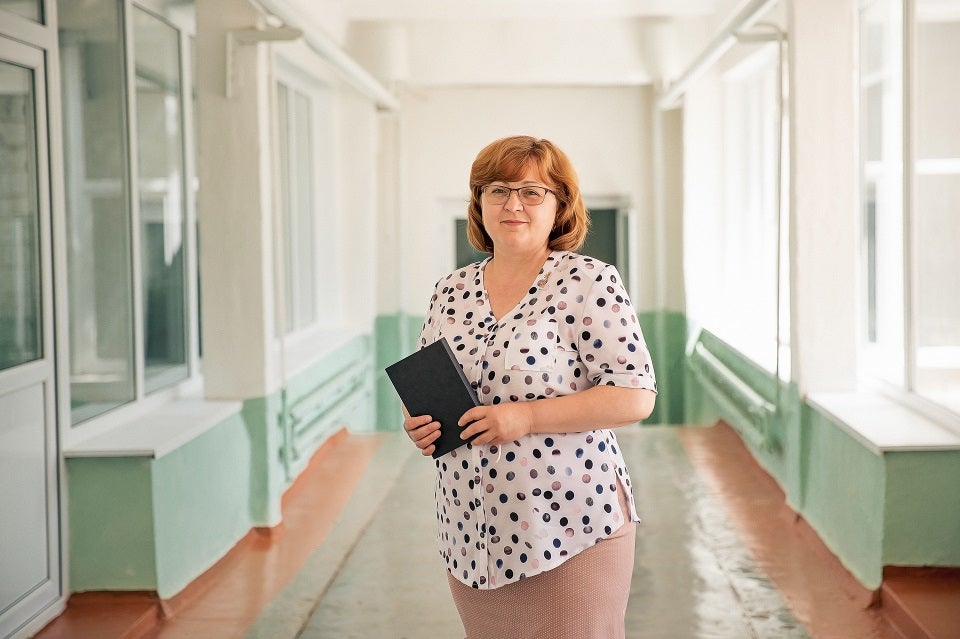Raisa Buga: One can not applaud with one hand
Date:

Photo: Stela Donțu/UN Women Moldova
Raisa Buga is a teacher of geography and the principal of the lyceum Dimitrie Cantemir from Cornesti, Ungheni district. Being a resident of Cornesti village, she has been working as a teacher for 32 years, always trying to promote gender equality in her community, educating several generations in the spirit of equality and mutual respect. The EVA project – Strengthened Gender Action in Cahul and Ungheni districts, funded by the European Union and implemented by UN Women in partnership with UNICEF, encouraged her in this mission, making her to understand how precious her effort is, and helping her to discover innovative tools for advancing gender equality, such as positive deviance.
“I live in Cornesti village from Ungheni district. My day begins before sunrise, with a cup of black coffee and the thought – not to miss the school bus, which drives me to the gymnasium from Cornesti town, where I have been teaching geography for thirty-two years, and several years ago becoming a principal. I grew up in a calm family, with the ambition and desire to make “our” world better. I lost my father when I was only 3 years old, and my mother never got married again.
In my childhood, I witnessed violence in other families, at my neighbors, and when I grew up, somebody told me that the men are always the family head and this phrase changed something in me. I think both women and men can do great things. I took my master’s degree when I was almost 40, and I noticed that, although men were less involved in learning activities, in the end they have been obtaining the same results as we do, women. Besides this, the church always had double standards towards women and men: women were „educated” in a humbling manner.
Such situations determined me to make a change in my community, to get involved. Thanks to different projects, as those supported by UN Women, I started teaching gender equality as an optional hour, although at the beginning it was taken with skepticism, it was immediately loved by children. The EVA Project made me to discover a tool I have been using previously, without realizing it – positive deviance. At the beginning, I was surprised to see the way things can work – making a change, focusing on a deviation from the norm! A simple but a grand discovery! Then, I understood that, using this method, I can help many problematic, violent families to be aware of the effects of this phenomenon.
Having analyzed families models living in harmony and having zero tolerance towards violence, I realized that when the father is more involved in children care and upbringing, there is less violence and children have a better academic performance.
Being guided by this pattern of positive deviance, I recently decided to intervene in such a family with 2 children that was under my observance for 5 years. Individual discussions with each adult from that family and encouraging the father to take small steps, such as washing children shoes from mud, taking children from the school and verifying whether they have all necessary school supplies brought good results. This father became one of the most caring and responsible parents in the school.
There were not so many research and education methods in the spirit of gender equality before but now we have more and more tools. Also, within EVA Project, I discovered 2 positive practices, functioning in the EU, related to violence prevention and combating that I decided to apply in school. One of them will be dedicated to promoting gender equality, and the other one, Silence is not golden, will raise awareness on violence and encourage people to report this phenomenon.
Unfortunately, women are still vulnerable because they don’t believe in themselves, being afraid to take a stand. In order to succeed, it is important for them to constantly educate and inform themselves. I have already noticed that girls of my children generation can express their views more clearly, this being not typical for women of my generation, who is featured by fear and obedience.
It is important to change the perception in the school, to start with manuals and to explain why fathers should not be represented only as mechanics or bricklayers, and mothers - as housewives. The EVA Project teaches us how to use innovation to advance the mission of gender equality in villages and towns from Ungheni district via education.
Additionally, the pandemic has changed many things over night. It made us understand how important it is to be together. The main lesson was – one cannot applaud with one hand. The screens made me to feel the isolation, to feel the lack of contact with the other hand, the feet back.”
Raisa Buga, with her 32 years of professional experience in education, promotes gender equality in her village via innovative educational methods. She applies positive practices taken from EU experience, creates role-playing games and works with local initiative groups. Raisa Buga is one of the beneficiaries of EVA Project – Strengthened Gender Action in Cahul and Ungheni districts, aiming at empowering local public authorities to prevent the phenomenon of gender-based violence and improving the capacity and the evaluation tools of responses and specialized multidisciplinary services.